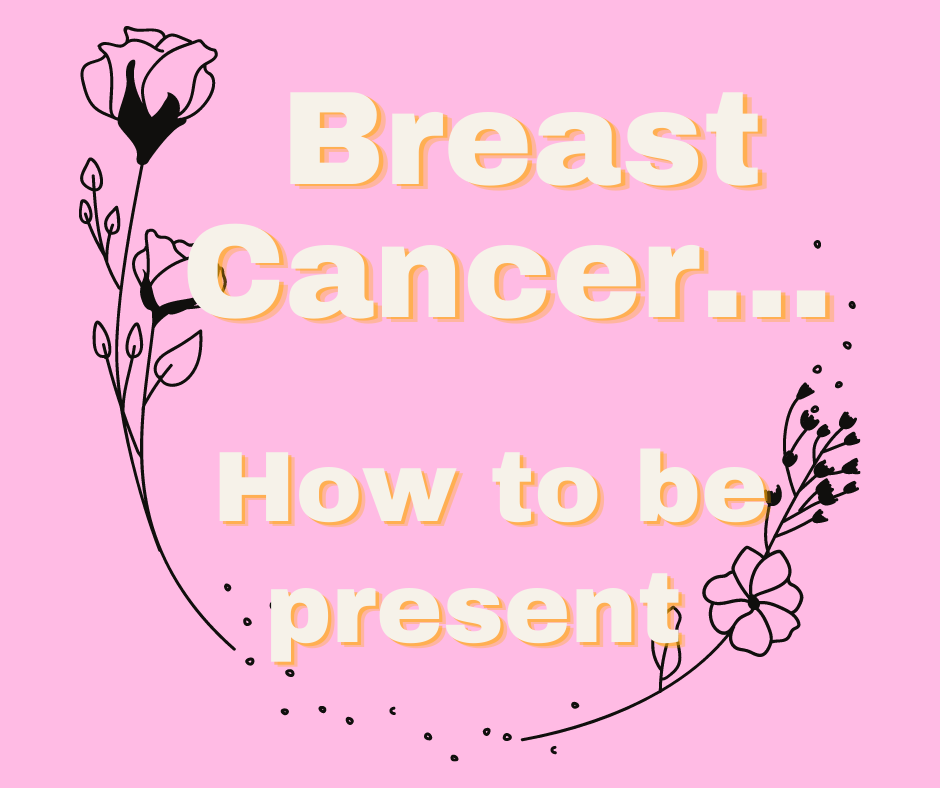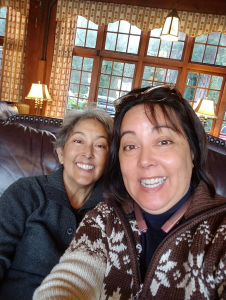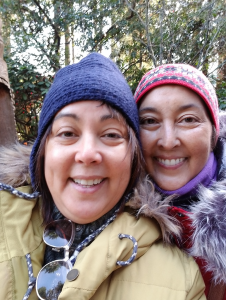With October here, I’ve been thinking about my sister more and more. I’ve been thinking about the last few years of her life and her breast cancer. Even now, I remember how much effort it took for me to be present and supportive. How do you support someone dying from breast cancer? All your insecurities, fears, hopes, and dreams tend to get caught up in the insecurities, fears, hopes, and dreams of people around you. It makes life messy. But, somewhere in between the messy can be beautiful mornings and stunning views.
Here are some opportunities to be more present to support someone who is dying from breast cancer so the two of you can have more beautiful mornings and stunning views and keep your emotional health.
WHAT DOES IT MEAN TO BE PRESENT
“The world is ruled by letting things take their course.
It cannot be ruled by interfering.”
-Chapter 48 Dao De Jing
I have been practicing Taoism for the last decade, and I still don’t know what it means and am confused when asked to explain it. Yet, it was this practice that helped me be present with my sister. My target was to work at removing my insecurities, fears, hopes, and dreams from our interactions so that we were walking only her insecurities, fears, hopes, and dreams. I took many lessons from Classical Chinese Medicine and Taoism to balance my emotional health. Here are some of my learnings.
Fear Becomes Your Companion
“When nothing is done, nothing is left undone.”
-Chapter 48 Dao De Jing
The pursuit of the Dao is the constant practice of letting go of desires. Buddhism calls it letting go of attachments. Mindfulness calls it being present in the now.
The Heshang Gong Commentary on the Dao De Jing finds inside this line desire.
“When desires are completely removed, Virtue and Dao join together. Then there is nothing which is not taken care of, nothing which is not managed.”
Susan Jeffers, Ph.D., wrote a beautiful little book, “Feel the Fear and Do It Anyway.” Any caregiving journey always has fear buried deep down inside. Even dwelling on the fear for an instant can threaten to consume you. Yet, not when you don’t acknowledge your fear all your fears show up as fixed ways of thinking or your beliefs. They turn into expectations start seeping into your interactions as advice or demands.
The most important lesson I learned from Susan Jeffers’s book was the root of fear is believing you will not be able to handle it. But you can handle it. Turn around and look at your life. You’ve handled everything up until now with 100% success.
So, lean into this 100%, and remember the Dao De Jing, “When nothing is done, nothing is left undone.” When supporting someone dying from breast cancer, use it as a guiding principle to catch yourself when you want to give advice. At that moment, do nothing so you can hear your loved one’s desires.
It’s not going to be easy because, throughout the journey, you will have thoughts that will conflict with theirs. I would tell myself, “This is their life, not mine.” My sister was already overwhelmed by her diagnosis. If I could lay down my desires, I would not become one more thing to flood her.
My sister had stage 4 breast cancer metastasized to the bone, brain, lung, and liver. She had been in a drug trial and receiving Neupogen shots three times a week. The shot helps push the bone marrow to create more white blood cells. One shot a month is a lot. Three a week is stunning. Yet, her body refused to respond.
She was removed from the study and completely cut off from the Neupogen shots. These shots had stripped the resources in her bone marrow to make blood cells, she had nothing. Usually, getting a person off a drug has a tapering down period like prednisone and Zoloft, but not Neupogen.
Her body quit working, and the cancer was unopposed. She was exhausted. Breathing was a chore. Yet, she wasn’t willing to give up. Probably out of love and respect for my sister, her doctor pulled one last type of chemotherapy out of the vault of chemos that could impact liver cancer.
I couldn’t help myself and shared my unsolicited advice, “Please don’t do this.”
I knew there was no survival, but I also knew she wanted to make her daughter’s graduation three months away, and I was 100% sure this treatment would be fatal, quickly.
But, my sister wanted to do this. She felt it was her only hope, and maybe she was right. Still, this was a bitter pill to swallow as I accepted her decision. I never mentioned the treatment again, and two weeks later, she crashed. And “crashed” means precisely what it sounds like. In another two weeks, my sister would be gone.
I wasn’t able to refrain from sharing my advice 100% of the time. But, I was strong enough to put down my advice whenever my sister expressed her desire to go in a different direction.
Fear, the hidden emotion that can make you rigid and unsupportive. You can handle it. They can handle it. There is no correct answer. Find a way to support theirs, and maybe the answer is within the Tao and doing nothing, “…there is nothing which is not taken care of, nothing which is not managed.”
Why Honesty is Important with Support of Someone Dying of Breast Cancer
“Following Dao…requires that we shed acquired habits and presumptions. In doing so we remove our fixed ways of seeing things and allow for open perception – for circumstances to arrive and leave without emotion or intellect automatically labeling experience.”
-The Heshang Gong Commentary on Lao Zi’s Dao De Jing
Honesty shows respect for another person. It shows that you acknowledge their life and respect their independence. You realize they can make informed decisions on their life and health, and they deserve to be able to make those decisions.
And then there is breast cancer, an overwhelming personal experience.
Withholding information or only sharing information that fits your desires is not honest. They have breast cancer. Why would you think they couldn’t handle the truth?
There are only one of two outcomes with sharing half-truths or no truth at all. Either they will know you are sharing half-truths and feel betrayed. Or, they believe you and find out later you were not being honest and feel betrayed.
In the Tao, betrayal is the emotion that closes off the heart, breaks down trust, and destroys your relationship, sometimes in subtle ways that you’ll never know.
You are not responsible for other people’s half-truths, only your own. So, if you hear someone’s half-truth, it isn’t your responsibility to correct them. But, if your loved one asks you, you are responsible for answering without bias.
In the last two weeks of my sister’s life, her systems were failing. I was moving her around in a wheelchair because her body would no longer follow her desires. I was feeling frustrated with the lack of information shared with my sister.
We were driving around the world. You probably know what I mean. We were driving around the world we had shared, places we had been, events we had shared. The afternoon sun beat through the windshield. My sister had flipped down the visor and was looking at her eyes. The whites had turned bright yellow over the last day or so.
“Kimmy, why are my eyes so yellow?” There was an innocence to the question that could have come from a young child wondering why the sky was so blue.
The question hit me like a hammer. I felt my body go rigid behind the steering wheel as my eyes suddenly locked on the road ahead of me. I knew I had to tell her what it was, but I also knew this would be the first time my sister heard she was dying.
“It’s jaundice.”
I couldn’t say anything else. Trying to explain it away or say anything to diminish the significance of jaundice at this point in her diagnosis would have been a half-truth. Out of the corner of my eye, I saw her body go rigid as she finally understood what was happening.
Without bias thing gets difficult. What is better, to know or not know? Is it your responsibility to make that decision for the person? Fear…you can handle it. They can handle it. Your relationship can’t handle a betrayal.
Being Present & Aware to Support Someone Dying from Breast Cancer
“…this is because things sometimes diminish themselves and then benefit.”
-Chapter 42 Tao De Jing
I knew I was walking the last of our days together, and it felt like I was trying to drink a glass of water and couldn’t get enough. I was trying to drink enough water to get me through the rest of my life without her.
We had spent three years working things out, remembering, trying to make sense of everything. My sister left me with a lot to think about. Even today, I sit and wonder about some of the twists and turns our lives took.
It’s Fall outside. It reminds me of the Fall afternoons in San Diego when we would be up in the foothills riding horses. The smell of the ocean still permeating the air even that far away. I can feel the riding boots, the jodhpurs, the reins in my hand, and my sister nearby. There was peace in those moments.
Throughout this journey, I reserved myself for myself and my sister. This was part of the path of the Tao to cultivate yourself through behavior. I abstained from getting too involved with those close to my sister to avoid their desires.
I worked at abstaining from my desires and wants to open my mind to her desires and wants.
Nothing is ever perfect. Yet, in the end, I gained great benefit. I had many more beautiful mornings and stunning views. I was able to avoid the regret that comes with a life unfinished. My sister and I were able to finish our life together.
Today, I miss her, but I am not in the world of regret and missed opportunities. The memories I remember the most and the memories that are the most beautiful were when I was there for her, pushing her wheelchair, hearing her hurts, understanding her needs.





